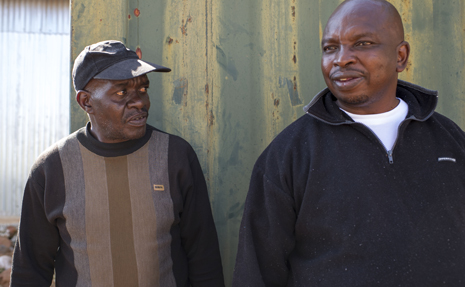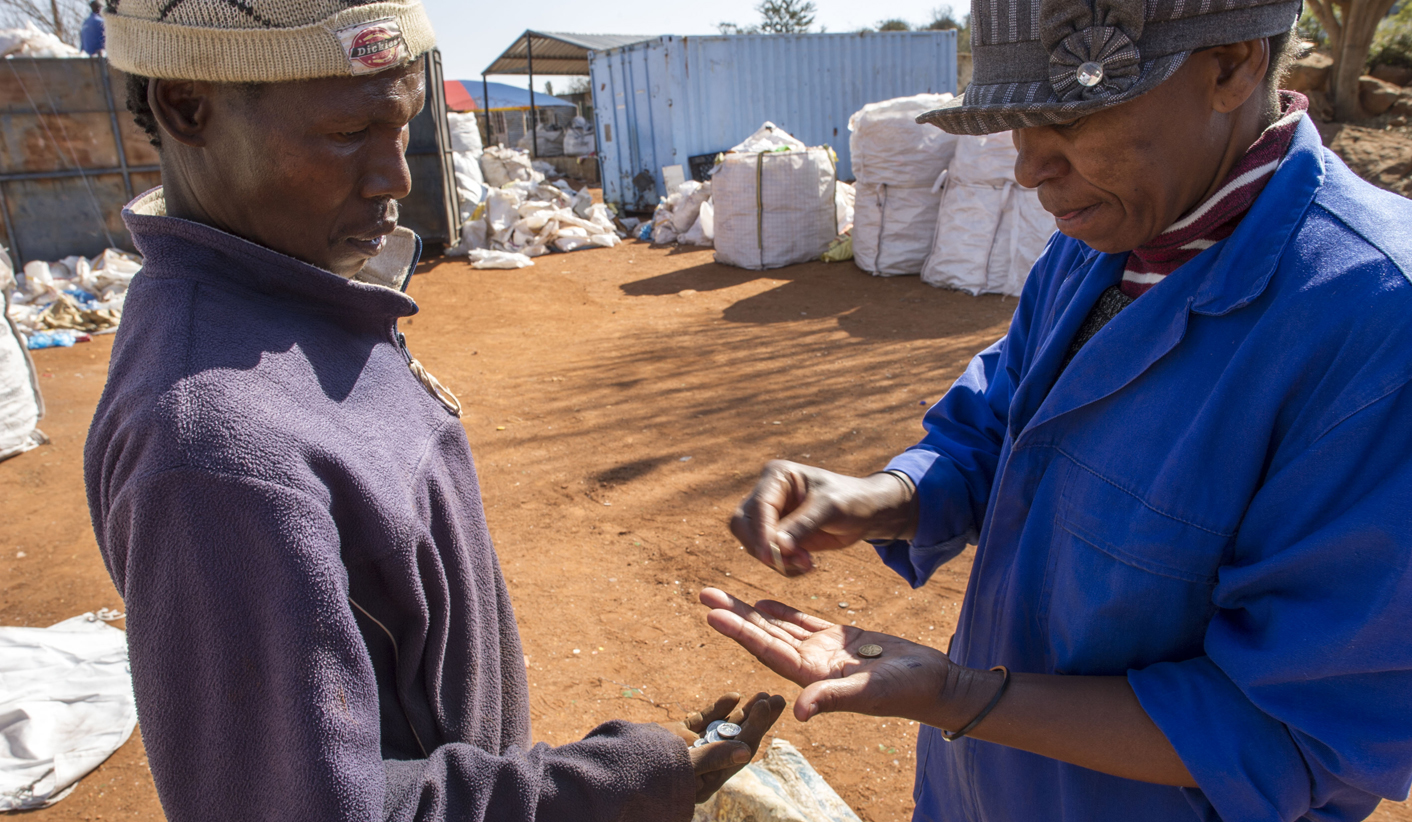Lucas Nhlapo is pulling a black PikitUp bin along the dusty, ochre road in Orange Farm. He lugs the bin past a fenced-in property bulging with mountains of plastic bags, aluminium cans and glass. He proceeds through the gate where people are sorting and packing plastic into a massive steel container.
In the middle of the yard there’s a clearing with a large scale. The more delicate parts of the scale’s digital instrumentation are wrapped in clear plastic to protect it from the dust. Nhlapo sorts his find into glass, plastic and aluminium, then the weigh-in begins.
“He comes here twice a day, sometimes three times a day,” says Sailor Matutoane, who works at the Orange Farm Human Rights Advice Centre, which supports the community with legal services, access to information and rights-based education. The centre is, in part, funded by the revenues it gets from recycling. This can be the sole source of income for the destitute, who bring laden bins here to get cash per kilo for useful waste.
Today Nhlapo did better than most days. “He can sometimes get six rands. Another time he can come again and get seven rand. He is always all over the world looking for these recycles (waste that can be recycled),” says Matutoane, who used to be a teacher but now works as an administrative assistant at the rights centre.
Daily Maverick asks whether Nhlapo gets help from the community with the collection of the waste he brings in. Matutoane acts as a translator. “Ai nix, nix. Nie een nie, nie een nie,” (Ai no, no. Not one… not one.) Nhlapo says, shaking his head, his slight frame covered in dust from head to toe from a morning spent scrabbling through the dry veld.
“He finds the ‘recycles’ in the veld,” says Matutoane, and then at Daily Maverick’s prompting asks Nhlapo to describe his experience of his daily fight for survival. Nhlapo speaks and Matutoane translates: “The work is straining. It is straining his body because he is saying that he is all over the place the whole day and therefore he’s getting tired.”
Does Nhlapo get enough to eat? “Aikona. Ai… nix,” Nhlapo replies. After a full morning’s hard manual labour, Nhlapo has brought in a full bin. Squashed aluminium cans get 50c a kilogram, plastic the same. Broken glass collects 30c a kilo. Today Nhlapo got R14.70 and it is already past noon. He’s been up since first light trying to get money so he can provide for his wife and child.

Photo: Benneth (surname unknown) (L) and Bricks Mokolo (right) during a meeting at the Orange Farm Human Rights Advice Centre. Among the people the center helps are community members like Benneth, who turned for help after not being paid for public works. By Greg Marinovich/Daily Maverick
“He does want to work but there is nowhere to work, and so this is the way he lives,” Matutoane explains. “He is not well. His body is always paining because of this job,” says Matutoane, a former teacher who is now becoming visibly emotional.
“This man is here every day, and sometimes even thrice a day. This man doesn’t get a social grant, and it is a pity because there is no work and he has been telling me that he has been looking for a job for quite a long time. He has no food and his wife is not working, so he is always all over the field looking for ‘recycles’ to make money,” Matutoane says.
“This morning he didn't make much. Maybe he might come back again and at least it will be R30 so that he can buy some mealie meal or bread. It is painful for me. Sometimes you feel pity for these people. Right now he is not going home, he is going back to the field. He goes there the whole day to look.”
“Poverty can make people lose their minds,” Matutoane says. “Like this man, you can say that he is mentally not very well. I think he has an infection, but the malnutrition can also really make someone go… Looking after a wife and children out of this little money is really pathetic. It is really pathetic,” Matutoane adds.
We’re standing outside a corrugated container that serves as a small administration centre for the Orange Farm Human Rights Advice Centre, which was started by a Canadian Catholic priest in 1997, but which faltered about six years later when funds from the European Union stopped coming through to support the project.
Soon after, a soccer-loving man called Richard “Bricks” Mokolo decided to take the centre over. A former ANC activist during the apartheid years, Mokolo had always been a go-to guy in the Orange Farm community.
“People were keeping on coming to me for advice, and I was providing free advice without a formal structure so I decided to re-establish the advice office. In 2008, I was approached by the Foundation for Human Rights of South Africa, who was aware of the advice office, despite our operating more informally,” says Mokolo.
The centre has expanded and now, aside from the legal support it offers, it helps people with the daily struggle they face in Orange Farm that can range from anything like unemployment to domestic violence to dealing with the hash-ups made by home affairs. The centre also runs a crèche called Itsoseng and renders assistance to refugees and asylum seekers.
Though Mokolo was an ardent supporter of the ANC pre-apartheid, he’s a little disillusioned 18 years into South Africa’s democracy. “When it is election time the ANC keep on promising free water, free electricity and free housing. Then everything is free, free, free. But you will find the poorest of the poor – they end up not being able to access the water or the electricity because only people who have money can access these services,” says Mokolo.
“The Constitution states all these basic services are a fundamental right, but there is this double standard that the government is playing. When they address the people, the government talks a different language and it seems as if the government is on the side of the poor,” says Mokolo, who made the front page of The New York times in 2003 by protesting the privatisation of water in Orange Farm.
“Privatisation is a new kind of Apartheid,” Mokolo told the New York Times close on 10 years ago. “Apartheid separated whites from blacks. Privatisation separates the rich from the poor.”
Back then the Times reported that municipalities were attracting private investment to turn inefficient, debt-ridden water utilities into profitable operations. For Mokolo this meant that people with money got water, but the poor got nothing.
“The ANC knows how to play games with the disadvantaged and the poor,” the activist says. “Every time they (the ANC) address black communities, they talk as if the government is on the side of the poor.”
Mokolo tells of a programme that invites the poor to declare their status so as to get special services. “People can go to the police station, sign the affidavit and take it to the municipality offices to state how poor they are so they can be given poor services. There is a service for the poor, a sub-standard development. So, if you want electricity you get 50kw of electricity - it is the electricity that you cannot even boil a kettle with. It is only just to put the globe in so you have light, and so the government can say: ‘Look. We care for the poorest of the poor.’ Democracy hasn’t changed things for the poor – these people are only getting more poor,” says Mokolo.
“People see through these ANC games, but people are always being threatened by the history of apartheid, and by how white people used to treat black people. If people try to look at alternatives they are told they are reversing the Apartheid.”

Photo: Gladys Mokolo (with her husband) runs a human rights centre, a recycling enterprise, community guidance and a creche from a rocky piece of land in Orange Farm. By Greg Marinovich/Daily Maverick
Mokolo describes a political world in which the ANC divides by being context-dependent. He says the new struggle in South Africa has nothing to do with colour, despite people being led to think it is by the ANC. The new struggle, he says, is the class struggle.
“Politicians are getting rich. They are becoming richer than anyone else, and the economic sharing isn’t fair. Politicians are living this posh lifestyle and they have forgotten the poor. But the poor are told: ‘Your time will come. Be patient. Give us chance.’ People are getting impatient,” says Mokolo who adds that the increased frequency of service delivery and other protests are evidence of this.
“Protests are increasing as people get angrier, but people are not sure who can be blamed. You change the ward counsellor and nothing happens. You change the state president and nothing happens. In real terms the situation of the poor is worse now than it was under Apartheid,” he says.
According to Mokolo, during apartheid there were different design standards for people in suburbs (whites) and people in townships (blacks). “The size of township housing developments back then was about 50 square metres. The ANC has reduced that size, and there is no plan to uplift communities developed during apartheid. The attitude to development hasn’t changed.”
The problem, says Mokolo, is that South Africa is cursed by a ruling party that no longer uses the public system it administrates. The minute politicians can move out of townships they stop using public transport and take their kids out of public schools.
“Our message to public officers is that they must drink public water, and not bottled water. They must ride on public trains, and go to public hospitals. How can they develop the public system when they know nothing about it, when they no longer use the system? That is why anything that’s part of the public system, like public transport, is a disaster. As long as politicians and the people they govern live in two separate worlds, the protests will never stop.”
Mokolo has been fighting for change his whole life. In the old days the fight was about bringing an end to apartheid so as to realise a democracy in which the ANC could materialise the Bill of Rights which promised adequate housing, food and water.
These days Mokolo fights for people like Lucas Nhlapo, who is no better off than he was 18 years ago. Earlier, before Nhlapo left with R14.70 in his pocket to buy food, Daily Maverick asked him what he wanted from the government. “I can request mainly the food to eat from the government,” Nhlapo said through a translator before pushing his black bin down the dusty road to go look for more ‘recycles’. DM
Read more:
- Gauteng highway barricaded in protest on TimesLive
- 'Some things were better under apartheid' at the BBC
- More information on the Orange Farm Human Rights Advice Centre
Main photo: Lucas Nhlapo receives R14 payment for recycling plastic, tins and glass. By Greg Marinovich/Daily Maverick





